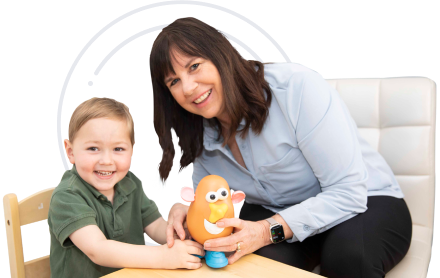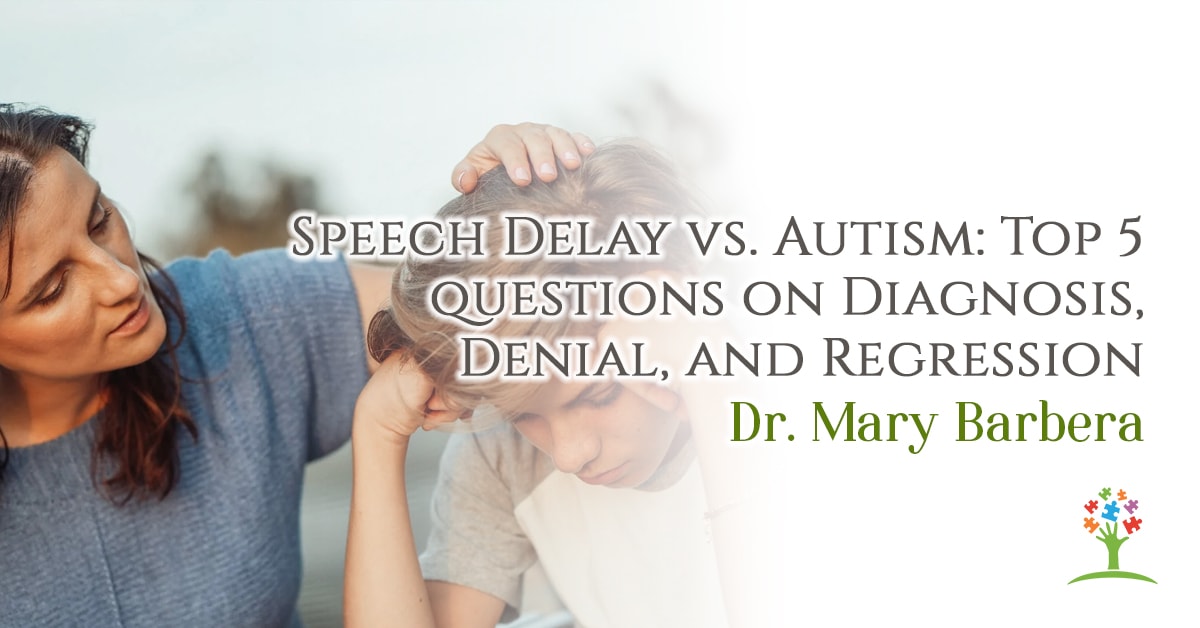Speech Delay Vs. Autism: Top 5 Questions on Diagnosis, Denial, and Regression
Want to Learn how to Increase Talking & Decrease Tantrums in Children with Autism or Toddlers Showing Signs?
Want to start making a difference for your child or clients?

Last week we continued our classic rebroadcast series with an episode from 2019, “Does my child have ADHD, a speech delay, or autism?”. This week Kelsey General, our Community Manager, joins me with our top 5 questions about this important topic.
1. What is the difference between autism, ADHD, and speech delays?
When you are having concerns for your child’s development, reading up on common disorders can make them all seem really similar. In fact, young children are often misdiagnosed for one or the other or given all three. Autism is usually the diagnosis that will umbrella all the signs and symptoms, but children with just some may get a speech delay or ADHD diagnosis. The good news is the intervention for these is all similar, the strategies from my courses will help improve the signs and symptoms you’re seeing whether you have a diagnosis of one, none, or all three.
2. What are the specific signs of autism versus specific signs of speech delay?
If your two-year-old is not yet talking and you’re concerned about autism or a speech delay, some specific indicators can be related to how they are communicating. Are they pointing? Are they using gestures? Are they showing toys? Are they touching body parts? How is their receptive language? Additionally for autism concerns; are they eating well? Are they sleeping? Are they having tantrums? In Chapter Two of Turn Autism Around I share the 10 potential signs of autism. The big difference between autism and speech delay is going to be awareness and intent of their communication.
3. What if signs and symptoms look more like speech delay than autism, will my kid just catch up?
Do not chance it!! There is really no way to know if a child without intervention would naturally catch up because no two children are alike and there is no way to compare. But why wouldn’t you try intervention? I don’t mean you have to sign up for full-time ABA therapy, but read my book, take my courses, and try intervention at home. It cannot hurt. These strategies are based on good parenting, play, fun, and learning and will only benefit even typically developing children.
4. I am noticing delays and signs of autism, what should I do first?
First and foremost, Don’t panic! Take some breaths, it’s going to be okay! You need to assess your child, so you can make a plan and help them. We’ve recently made my one-page assessment digital, which you can still at the time of this recording access for free. Once you’ve assessed them, make a plan. Determine the areas your child is behind on and get to work. Not only can use take advantage of my free content but don’t get stuck there, join the courses and community, read my book, and put in the time necessary to get working with your child and turn things around.
5. Is it important to get a diagnosis and label my child?
Yes and no. Is a diagnosis going to determine how well an intervention works? No. You can get started on intervention and turning things around without a diagnosis. You do not have to wait for a label to get started, like I’ve said before these strategies are not going to hurt or change depending on the diagnosis. But having an autism diagnosis can make the difference between receiving ABA and other services, placement in a safe school for the child, and especially funding in your community or through insurance. So get on the waitlist, contact your doctor, and do all of those steps to get on the path to a diagnosis, but do not wait for a diagnosis to get started.

You’ll Learn
- What is the difference between autism, ADHD, and speech delays?
- What are the specific signs for autism or speech delays?
- Will my child catch up without intervention?
- What to do first when you have concerns of autism or delays.
- Is a diagnosis important?
- Where to find important information related to development and delays.
- Where to find free and paid information to help your child.
Resources
- Workshops
- Assessment App – Autism Mom, ABA Help for Professionals and Parents
- Hyperlexia in Children
- Diagnosing Autism During COVID19 Pandemic | Interview with Dr. Catherine Lord
- Why Teaching Carrier Phrases is a Bad Idea
- CDC’s Developmental Milestones | CDC
- Delayed Echolalia and Scripting in Children with Autism
- 10 Early Warning Signs of Autism
- How is Autism Diagnosed? Testing & Treatment Recommendations with Dr. James Coplan
- Is Your 2-year-old not Talking? How Katty Turned her Son’s Speech Delay Around
- How to Recognize Early Signs of Autism in Toddlers Using MCHAT
- Autism Case Study with Michelle C : From 2 Words to 500 Words with ABA Online Course
- Case Study: Online Parent ABA Training and Expressive Language in a Toddler Diagnosed with Autism
- Workshops
- Mary Barbera on Facebook
- Mary Barbera on TikTok
- Mary Barbera on Instagram
Want to Learn how to Increase Talking & Decrease Tantrums in Children with Autism or Toddlers Showing Signs?
Want to start making a difference for your child or clients?
